10 Things You Should Be Keeping in Your Refrigerator That Aren’t Food
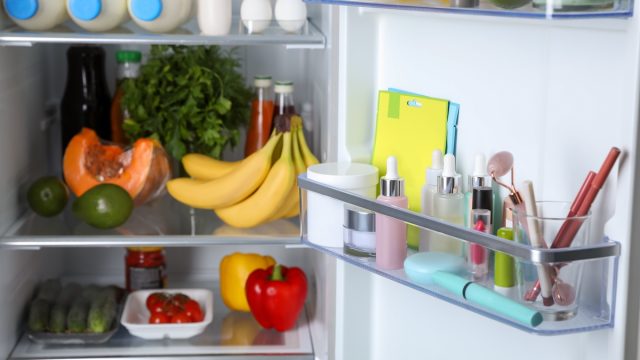
You might have heard that putting certain clothing items in the freezer can kill bacteria, but did you know there are plenty of household hacks involving your fridge, too? From items in your medicine cabinet to those in your junk drawer, you’d be surprised how many common things can benefit from relocating to cooler temps. To get a full list, we spoke to cleaning and lifestyle experts. Keep reading to learn which 10 non-food items you should be keeping in your refrigerator.
READ THIS NEXT: 10 Mistakes You’re Making That Keep Your House Cold, Experts Say.
1
Tooth Whitening Gels

In a roundup of the weirdest things Food Network stars have in their fridges, celebrity chef Giada De Laurentiis said it’s “teeth whitener.” Turns out, it isn’t so weird.
According to Crest, which makes the popular Whitestrips, “Most manufacturers recommend storing tooth whitening kits in a cool place … For some, under the bathroom cabinet or in a linen closet is appropriate. Others who live in extremely warm climates may want to store tooth whitening kits in the refrigerator.”
2
Film
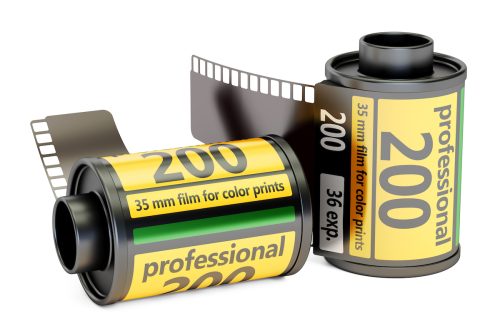
If you’re a fan of shooting photography with old-school film, you know that it can get expensive. To preserve the life of your film, stick it in the fridge.
“We recommend storing our film flat inside a fridge at a constant temperature between 4 – 18°C / 41 – 65°F,” says Polaroid on its website. Any temperature colder than that can ruin the film, and you’ll want to let it return to room temperature before putting it in your camera.
3
Aloe
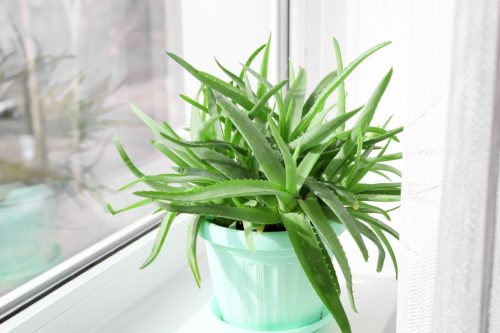
Store-bought aloe vera gel typically has a decently long shelf life, but a benefit to keeping it in the fridge is that the cool temperature feels extra soothing on sunburns or other burns.
Fresh aloe from a plant, however, can go bad quite quickly. If you clip off a leaf and use it right away, you’re fine. But if you want to store it longer, Erin James, certified sports nutritionist and founder of SQUAY Wellness, tells WELL + GOOD to put it in the refrigerator in an air-tight container.
READ THIS NEXT: 4 Convincing Reasons to Start Washing Your Clothes in Cold Water, According to Experts.
4
Skincare Products
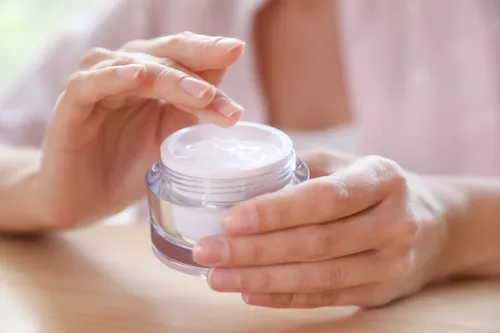
One of the most common responses we received from experts is to keep skincare products in the refrigerator.
“The concept of skincare products without preservatives appeals to a lot of people. But bacteria are also more likely to grow on these goods,” explains Gretchen Boyd, president of NYC House Cleaners. “Similar to how it affects food, the refrigerator can extend their ‘shelf life.'”
Products that contain retinol or vitamin C should specifically be kept in the fridge. “The cold temperatures slow down the degradation of both ingredients,” explains beauty subscription company Birch Box.
According to Carly Campbell, founder of Mommy on Purpose, an added benefit is that the cool temperature “can help to soothe and reduce inflammation and can also help to tighten and firm the skin.” This is especially true with eye creams.
Grace Baena, brand director at furniture company Kaiyo, recommends keeping sunscreen in the fridge for these same reasons.
5
Makeup
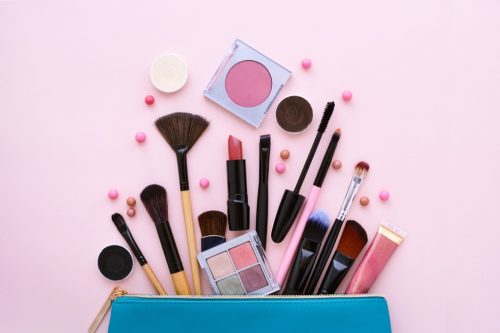
Most of us would probably be horrified to see when our makeup products expired. But keeping certain items in the fridge will prolong their life.
Boyd notes that cream- or water-based cosmetics (such as mascara and liquid foundation) are especially susceptible to “bacterial growth, oxidation, and color fading.” Another benefit Boyd points out is that if products such as eyeliner are cool, their application will be more precise.
A lot of people will say to keep lipstick in the fridge, but as Birch Box explains, this should only be a temporary fix if it’s started to melt: “Stick it in the fridge until it re-solidifies, then take it out when you’re ready to apply. (Don’t store lipstick in the fridge forever, however: oil and wax separate over time in cold temp.)”
6
Nail Polish
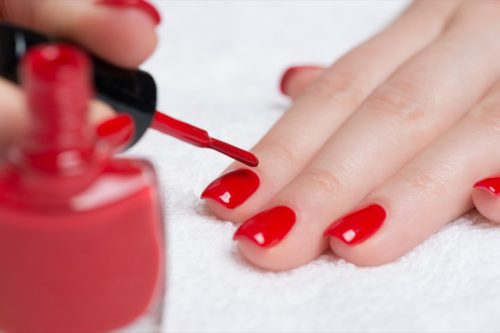
“Nail polish can become thick, gloopy, and difficult to apply if it is not stored correctly,” says Campbell. “Keeping it in the fridge can help to extend its shelf life and prevent it from becoming too thick or clumpy.” Just be sure to give it a good shake when you’re ready to paint your nails.
For more home advice delivered straight to your inbox, sign up for our daily newsletter.
7
Flowers
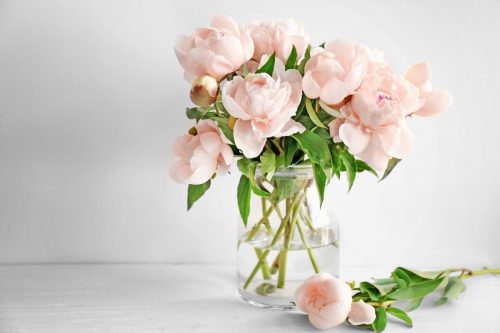
Want to preserve some fresh-cut flowers until your dinner party that’s a few days away? Keeping them in water in a cool place, such as the fridge, “will slow down their metabolic processes and keep them going a bit longer,” according to The Washington Post.
However, avoid placing them next to fruit, which gives off ethylene. As the Post explains, just like these gases cause other fruits and vegetables to ripen, so too will they accelerate the lifespan of your flowers.
Campbell says to “remove any foliage below the water line, as this can cause the water to become contaminated and shorten the life of the flowers.”
8
Baking Powder and Baking Soda
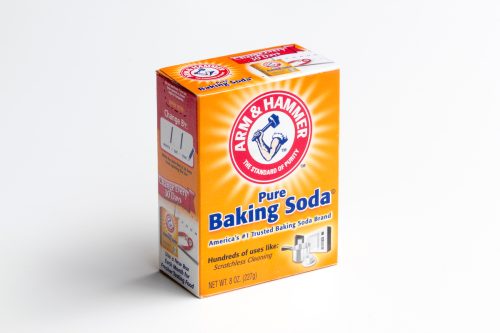
Yes, these items are in the food category, but the reason for keeping them in the refrigerator has nothing to do with baking or cooking.
“Baking soda absorbs odors from foods like onions, garlic, and fish which can be transferred to other foods stored nearby if not properly contained,” explains Louis Ryan, director of Food Guard, which makes automated HACCP systems. “Baking powder removes unwanted odors from these same items but also adds some freshness back into them with its chemical reaction when mixed with water; this process helps remove unpleasant smells while replacing them with a fresh, baking-like aroma”
9
A Thermometer
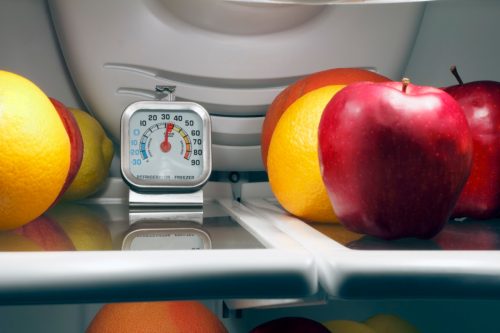
In many refrigerators, the temperature knob only gives a range, say cold to coldest. In these cases, Ryan recommends keeping a thermometer inside. “It helps me keep track of the temperature, which is important for keeping food safe to eat. The FDA recommends that you keep your refrigerator at 38 degrees or below and your freezer at 0 degrees or below.”
READ THIS NEXT: Never Put Meat in the Fridge Without Doing This First, CDC Warns.
10
Certain Medicines
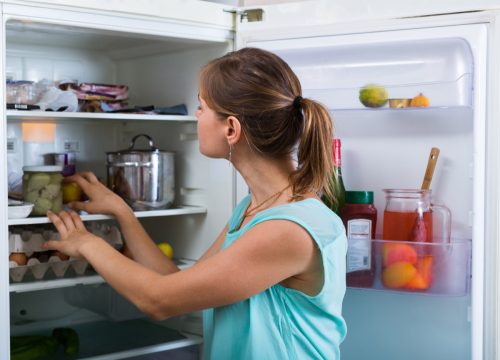
Your doctor or pharmacist should tell you if any of your prescription medications require refrigeration. According to Robert Johnson, senior director of merchandising at Coast Appliances, some examples include “eye drops, insulins, hormone injections, antipyretic drugs, antibiotic liquids, and chemotherapy tablets.”
Aside from ensuring these are stored at the appropriate temperature (which your thermometer can help with), Johnson advises keeping them away from air vents “to prevent ice crystal formation” and not putting them in the door, as the temperature there fluctuates more.
Of course, always consult with your healthcare provider about medication storage.